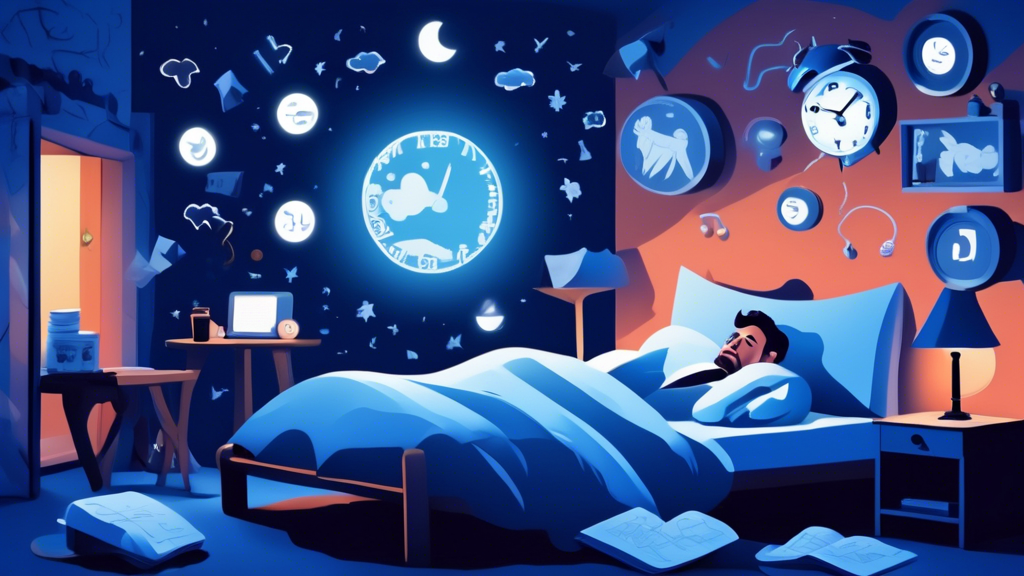Top Sleep Myths Debunked: What Men Need to Know
Sleep is crucial for maintaining good health, particularly for men, who often face unique challenges that can impact their sleep quality. Given the widespread misinformation surrounding sleep, it’s important to address and debunk common myths that may be hindering you from getting the restful sleep you need. This article aims to dismantle some of the most prevalent sleep myths, providing you with evidence-based insights and expert advice to improve your overall health and well-being.
Proper sleep is not just a matter of feeling rested; it plays a vital role in various aspects of health, including cognitive function, physical performance, and emotional stability. Men, in particular, may experience sleep-related issues differently, making it essential to understand and rectify misconceptions that could be affecting your sleep patterns. In the following sections, we will delve into some of the most pervasive sleep myths affecting men’s health, exploring the truth behind these misconceptions and offering valuable tips for better sleep hygiene.
By understanding the reality behind myths such as snoring is harmless, you can catch up on sleep during weekends, and more sleep is always better, you can begin to make informed decisions to foster healthier sleep habits. As we debunk these myths, we will provide research findings, expert insights, and practical advice to help you achieve a restful and rejuvenating sleep. Additionally, we’ll offer strategies to enhance your sleep environment, adjust your lifestyle, and establish routines that promote better sleep quality. This comprehensive approach will empower you to make positive changes, ensuring you get the rest you deserve and ultimately improving your overall health.
Introduction to Common Sleep Myths
Getting enough sleep is crucial for maintaining optimal health, particularly for men. Sleep plays a vital role in various bodily functions, including muscle recovery, mental health, and overall well-being. Insufficient or poor quality sleep can lead to numerous health issues such as weight gain, weakened immune function, and even heart disease.
Despite its importance, many individuals hold on to outdated or incorrect beliefs about sleep, which can negatively affect their health. This article aims to shed light on some of the most prevalent sleep myths and provide evidence-based information to help men make informed decisions about their sleep habits.
Debunked Sleep Myths Affecting Men’s Health
Myth 1: Snoring is Harmless
One common misconception is that snoring is merely an annoying but benign habit. Many men assume that if they snore, it is simply a minor inconvenience for their bed partners and not something that requires medical attention. However, this belief is far from the truth.
Snoring can be a symptom of a more serious condition known as obstructive sleep apnea (OSA). OSA is characterized by repeated interruptions in breathing during sleep, which can lead to fragmented and poor quality sleep. Research indicates that untreated sleep apnea can increase the risk of high blood pressure, heart disease, type 2 diabetes, and stroke. Additionally, it can lead to excessive daytime sleepiness, affecting cognitive function and increasing the risk of accidents.
Healthcare professionals recommend that men who snore loudly and frequently, especially if accompanied by gasping or choking sounds, should seek medical advice. Diagnosing and treating conditions like sleep apnea is essential for maintaining overall health and well-being.
Myth 2: You Can Catch Up on Sleep During Weekends
Another prevalent myth is the belief that you can counteract a week of poor sleep by catching up on rest over the weekend. While it may seem intuitive, this practice does not fully compensate for the cumulative sleep debt incurred during the week.
Studies have shown that irregular sleep patterns, such as sleeping significantly longer on weekends, can disrupt the body’s internal clock, also known as the circadian rhythm. This disruption can lead to problems such as insomnia and fatigue.
Moreover, chronic sleep deprivation throughout the week can have deleterious effects on the body. Research reveals that consistent lack of sleep can impair cognitive function, weaken the immune system, and trigger metabolic changes that increase the risk of obesity and diabetes.
To support overall health, it is important to maintain a consistent sleep schedule, even on weekends. Going to bed and waking up at the same time every day helps regulate the internal clock and promotes more restorative sleep.
Myth 3: More Sleep is Always Better
While it is true that getting sufficient sleep is essential for health, the notion that more sleep is always better is also misleading. Oversleeping can be just as detrimental as not getting enough sleep.
Scientific studies suggest that the optimal amount of sleep for most adults, including men, ranges from 7 to 9 hours per night. Sleeping significantly more than this recommended duration can be associated with various health issues. For instance, oversleeping has been linked to an increased risk of cardiovascular disease, diabetes, and mental health disorders such as depression.
Additionally, excessive sleep may be a sign of underlying health conditions, including sleep disorders, thyroid issues, or mood disorders. If you consistently find yourself needing more than 9 hours of sleep to feel rested or experience excessive daytime sleepiness, it is advisable to consult a medical professional for evaluation.
Understanding and adhering to the guidelines for optimal sleep duration help ensure that you get the restorative rest needed without tipping the balance towards potential negative consequences.

Debunked Sleep Myths Affecting Men’s Health
Myth 1: Snoring is Harmless
One of the most common misconceptions is that snoring is a benign, albeit annoying, habit. Many men believe that snoring is merely a natural part of sleep and not something to be concerned about. However, this myth couldn’t be further from the truth.
Snoring often serves as a warning sign of obstructive sleep apnea (OSA), a serious sleep disorder characterized by repetitive pauses in breathing during sleep. According to Dr. John Hopkins, people with sleep apnea stop breathing for at least 10 seconds at a time, which can happen hundreds of times a night. This leads to fragmented sleep and puts significant strain on the heart, increasing the risk of cardiovascular issues such as hypertension, heart attacks, and strokes.
Additionally, chronic snoring can lead to daytime sleepiness, reduced alertness, and impaired cognitive function. These issues are particularly concerning for men who may already be dealing with stress from work and personal life. Untreated snoring can also contribute to relationship problems, as it often disturbs the sleep of partners.
Health experts recommend consulting a healthcare provider if you or someone you know is dealing with chronic snoring. Early diagnosis and treatment are crucial, as there are effective therapies available, including lifestyle changes, use of CPAP (Continuous Positive Airway Pressure) machines, and even surgical interventions, if necessary.
Myth 2: You Can Catch Up on Sleep During Weekends
The idea that one can accumulate sleep debt during the weekdays and make up for it by sleeping in on weekends is widespread, but scientifically flawed. Many men adopt this approach, especially those juggling demanding careers and personal commitments. However, research indicates that this practice does not compensate for lost sleep and may even have adverse effects.
According to a study published in the Journal of Sleep Research, sleep debt, or the cumulative effect of not getting enough sleep, can disrupt numerous physiological systems. Chronic sleep deprivation affects cognitive performance, mood, and metabolic health. It can lead to increased cravings for high-calorie foods, weight gain, and a higher risk of developing type 2 diabetes.
Moreover, irregular sleep schedules can interfere with the body’s internal clock, also known as the circadian rhythm. This can lead to social jetlag, which mimics the feeling of traveling across multiple time zones, leaving one feeling perpetually out of sync.
Experts suggest maintaining a consistent sleep schedule, even on weekends. Going to bed and waking up at the same time every day helps regulate the body’s internal clock, thereby improving sleep quality. Short naps during the day can be beneficial but should not be used as a substitute for regular, sufficient nighttime sleep.
Myth 3: More Sleep is Always Better
While insufficient sleep is a well-recognized issue, the opposite misconception—that more sleep is always better—is just as problematic. Some men operate under the belief that sleeping as much as possible will help them feel more rested and improve their health. However, excessive sleep can be just as harmful as insufficient sleep.
The National Sleep Foundation recommends that adults aged 18-64 aim for 7-9 hours of sleep per night. Deviating significantly from this range, particularly on the higher end, has been associated with several health risks. Sleep duration exceeding 9 hours is linked to cardiovascular issues, obesity, and even a higher mortality rate.
Oversleeping can also signal underlying health problems such as depression, thyroid issues, or sleep disorders like sleep apnea. It can lead to grogginess and decreased productivity, mimicking the effects of sleep deprivation.
Understanding the importance of balanced sleep is essential. Aim for the recommended 7-9 hours per night, and pay attention to how you feel during the day. If you consistently need more than 9 hours and still feel tired, it may be time to consult a healthcare provider to rule out any underlying conditions.

Tips for Better Sleep Hygiene
Practical Advice for Establishing Healthy Sleep Habits
Healthy sleep habits, often referred to as sleep hygiene, are crucial for ensuring quality rest and overall wellbeing. One key aspect is maintaining a consistent sleep schedule. Going to bed and waking up at the same time every day, including weekends, helps regulate your body’s internal clock. This consistency can improve the quality of your sleep, making you feel more refreshed and energized throughout the day.
Another vital habit is creating a pre-sleep routine. This could include activities like reading a book, taking a warm bath, or practicing relaxation techniques such as deep breathing or meditation. Establishing a calming pre-sleep ritual signals to your body that it’s time to unwind, making it easier to fall asleep.
Limiting exposure to screens before bedtime is also crucial. The blue light emitted by phones, tablets, and computers can interfere with the production of melatonin, a hormone that regulates sleep. Aim to turn off electronic devices at least an hour before bed to help your body naturally prepare for sleep.
Importance of Sleep Environment and Routine
Your sleep environment plays a significant role in the quality of your rest. It’s essential to ensure that your bedroom is conducive to sleep. Start by keeping your sleeping area cool, dark, and quiet. The ideal temperature for sleep is around 65 degrees Fahrenheit (18.3 degrees Celsius). Consider using blackout curtains or a sleep mask to block out any light, and earplugs or a white noise machine to minimize disruptions from noise.
Investing in a comfortable mattress and pillows can make a significant difference in your sleep quality. Your bed should support your body without causing any discomfort or pain. Over time, mattresses and pillows can lose their supportive properties, so it may be worth considering a replacement if yours are old or worn out.
Using your bed exclusively for sleep and intimacy can also improve your sleep hygiene. This helps strengthen the association between your bed and sleep, making it easier to doze off when you lie down at night.
Recommendations on Diet, Exercise, and Lifestyle Changes to Promote Quality Sleep
Your daily habits, including your diet, exercise routine, and lifestyle choices, can significantly impact your sleep quality. Here are some recommendations to help promote better sleep:
- Diet: Avoid large meals, caffeine, and alcohol close to bedtime. Eating a heavy meal can cause discomfort and indigestion, making it difficult to fall asleep. Caffeine and nicotine are stimulants that can interfere with your ability to fall asleep, while alcohol might initially make you sleepy but can disrupt your sleep cycle later in the night. Instead, opt for light snacks if you’re hungry before bed, such as a small bowl of oatmeal or yogurt.
- Exercise: Regular physical activity can promote better sleep, helping you fall asleep faster and enjoy deeper sleep. Aim for at least 30 minutes of moderate exercise on most days, but try to finish exercising at least a few hours before bedtime. Exercising too close to bedtime can have the opposite effect and make it harder to fall asleep.
- Lifestyle Changes: Managing stress and anxiety is crucial for good sleep hygiene. High stress levels can make it difficult to fall and stay asleep. Incorporate stress-reducing techniques into your daily routine, such as yoga, meditation, or engaging in hobbies you enjoy. Additionally, keep a sleep journal to track your sleep patterns and identify any factors that might be disrupting your sleep. Knowledge of these patterns can help you make necessary adjustments to improve your sleep quality.
By implementing these practical tips and maintaining a sleep-supportive environment, you can significantly enhance your sleep hygiene. This, in turn, will lead to better overall health, improved mental clarity, and greater productivity in your daily life.
In conclusion, understanding and addressing the myths surrounding sleep is essential for men who want to maintain good health. Through our examination, we’ve highlighted that dismissing snoring as harmless ignores potential underlying health issues that could have serious consequences if left untreated. Additionally, the belief that sleep lost during the week can be fully regained over the weekend is a misconception; such practice disrupts the body’s natural rhythms and leads to lingering effects on one’s well-being. Similarly, while sleep is crucial, more is not always better—oversleeping can actually be detrimental, leading to various physical and mental health problems.
Adopting better sleep hygiene can support a healthier lifestyle. Establishing consistent sleep patterns, creating a sleep-conducive environment, and paying attention to diet and exercise can make a significant difference. By debunking these common sleep myths and applying the recommended sleep practices, men can improve their sleep quality, which in turn, will enhance their overall health and productivity. It is through such informed adjustments that men can achieve the restorative sleep necessary for both physical and mental well-being.

